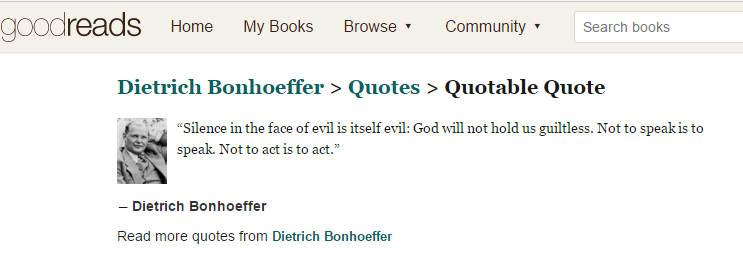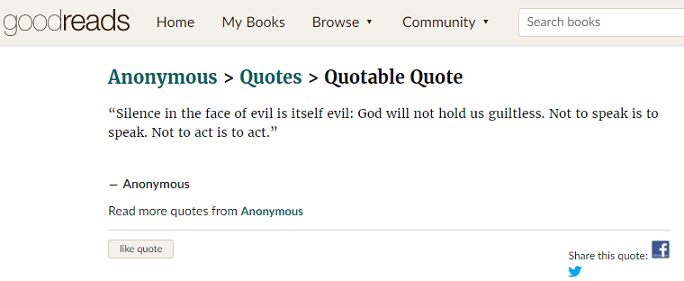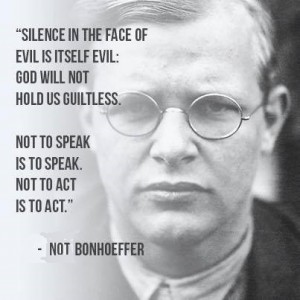 Dietrich Bonhoeffer is a modern day hero among evangelical Christians. Killed by the Nazis in 1945 for resisting the regime, Bonhoeffer’s fame among evangelicals increased after the publication of Eric Metaxas’ acclaimed biography of the Lutheran pastor. For many Christians who feel compelled to take a stand on principle, Bonhoeffer has become an inspiration and guiding light. On that point, perhaps the most repeated and celebrated quote attributed to Bonhoeffer is
Dietrich Bonhoeffer is a modern day hero among evangelical Christians. Killed by the Nazis in 1945 for resisting the regime, Bonhoeffer’s fame among evangelicals increased after the publication of Eric Metaxas’ acclaimed biography of the Lutheran pastor. For many Christians who feel compelled to take a stand on principle, Bonhoeffer has become an inspiration and guiding light. On that point, perhaps the most repeated and celebrated quote attributed to Bonhoeffer is
Silence in the face of evil is itself evil. God will not hold us guiltless. Not to speak is to speak. Not to act is to act.
These are bold words and together they have helped strengthen the conclusion of many persuasive appeals. Though they are powerful, they are not from Bonhoeffer. According to my research and the Bonhoeffer scholars I consulted, these sentences can’t be found in any of his writings or speeches.
This may come as a shock to countless (really, I stopped counting) Twitter and Facebook users who have posted a picture of Bonhoeffer with that quote attributed to him. The quote is on many lists of essential Bonhoeffer quotes (e.g., see Relevant Magazine’s list). Many politicians and authors have used it to make their many points.
I became interested in the quote while researching this May 22, 2016 tweet from Eric Metaxas:
As Bonhoeffer said “Not to cast a vote for the two majors IS to cast a vote for one of them.” – Ethics, pp. 265-6
Although it wasn’t obvious to me at first, this was a joke based on “Not to speak is to speak. Not to act is to act.” Metaxas posted this in response to a Twitter user who described people who plan not to vote for Hillary Clinton or Donald Trump.
At the time, his Twitter followers didn’t get the joke. Here are some of their tweets in response: “sounds like Bonhoeffer made a boo boo,” “Mr Bonhoeffer was right about many things but still a mere mortal!” and “Sorry, but I think the great Bonhoeffer whiffed on this one.” I couldn’t find anyone who questioned the authenticity of the modified quote.
My entrance into the thread was in late July when a Twitter user asked Metaxas for the quote’s source. One purchased Bonhoeffer’s book on ethics to look up the quote but couldn’t find it. After several days on July 31, Metaxas tweeted
This has gotten out of hand. The ORIGINAL Bonhoeffer fake quote was intended as an OBVIOUS joke. It obviously failed. (emphasis in the original)
Like his Twitter followers, I also looked for the source of the “original fake quote.” In doing so, I learned something more interesting; the popular quote on which Metaxas’ joke was based (“Not to speak is to speak. Not to act is to act.”) had been incorrectly attributed to Bonhoeffer.
Questioning the Quote
As far as I can tell, the authenticity of the quote was first questioned in 2013 by Doris Bergen in a book edited by Clifford Green and Guy Carter titled Interpreting Bonhoeffer:
Many lists of “Bonhoeffer quotes” include a sharper indictment: “Silence in the face of evil is itself evil. God will not hold us guiltless. Not to speak is to speak. Not to act is to act.” See also Eric Metaxas, Bonhoeffer: Pastor, Martyr, Prophet, Spy. (Nashville: Thomas Nelson, 2010), back flap. However, this formulation has not been found in Bonhoeffer’s works.
In a 2015 issue of the Australasian Journal of Bonhoeffer studies, Erich von Dietze also cast doubt on the quote.
While commonly attributed to Bonhoeffer, the origin of this quote remains uncertain. The quote has been referenced to Metaxas, E. Bonhoeffer: Pastor, Martyr, Prophet, Spy – A Righteous Gentile vs the Third Reich. (Nashville: Thomas Nelson, 2010). However, I have not been able to find it in this work.
The online resource Wikiquotes considers the quote to be “misattributed” to Bonhoeffer and names an obscure organization newsletter as the possible source.
First attributed to Bonhoeffer in Explorations 12:1 (1998), p. 3, as referenced by James Cone (2004) Theology’s Great Sin: Silence in the Face of White Supremacy, Black Theology, 2:2, 139-152, footnote 1.
Explorations was the newsletter of the now defunct American Interfaith Institute, founded by the late Irvin Borowsky. Borowsky also founded the Liberty Museum in Philadelphia. I located the newsletter via the online World Catalog and received a copy of the newsletter courtesy of the document delivery service at Grove City College.
On page three of the newsletter is an article by Borowsky which promoted the opening of the Heroes exhibit at the Liberty Museum in 1998. One of the featured heroes is Dietrich Bonhoeffer. The description on the exhibit is as follows:
He was a Lutheran pastor who left Germany in 1933 at age 27 to protest the Nazi regime’s introduction of anti-Jewish legislation. He could have stayed permanently in England, or later the U.S., but repeatedly returned home to oppose Hitler from within. Helping Jews to escape to Switzerland during the war, he also organized church-based resistance. Arrested in 1943, he was hung for treason in 1945 just days before the end of the Third Reich. According to Bonhoeffer, “Silence in the face of evil is itself evil. God will not hold us guiltless. Not to speak is to speak. Not to act is to act.” (emphasis in the original)
I have been in contact with Borowsky’s daughter Gwen who now manages the museum. Now that she knows the quote isn’t accurate, the exhibit will be changed when that gallery is remodeled (photo of current exhibit). She has no knowledge of the source of the quote since the researcher responsible for it has died. I cannot find it anywhere before 1998.
After 1998, a few citations appear in various data bases but the most prominent is the one by Union Theological Seminary professor James Cone in his article “Theology’s Great Sin: Silence in the Face of White Supremacy” published in the journal Black Theology in 2004. Cone attributed the saying to Bonhoeffer and cited the Explorations newsletter as his source.
Bonhoeffer: Pastor, Martyr, Prophet, Spy
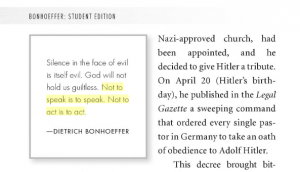 By far, the greatest number of references to the quote have come after the publication of Eric Metaxas’ biography of Bonhoeffer in 2010. On the back flap of the book, the quote is attributed to Bonhoeffer. In his student guide and study guide for the Bonhoeffer book, Metaxas attributed the quote to Bonhoeffer. It also appears in his 2014 book Miracles. He has tweeted the quote attributed to Bonhoeffer in 2012 and 2013. Several other Christian books cite Metaxas as the source of the quote.
By far, the greatest number of references to the quote have come after the publication of Eric Metaxas’ biography of Bonhoeffer in 2010. On the back flap of the book, the quote is attributed to Bonhoeffer. In his student guide and study guide for the Bonhoeffer book, Metaxas attributed the quote to Bonhoeffer. It also appears in his 2014 book Miracles. He has tweeted the quote attributed to Bonhoeffer in 2012 and 2013. Several other Christian books cite Metaxas as the source of the quote.
I contacted Metaxas via his website and Twitter in early August to ask for his source. He did not respond.
Since Metaxas’ book was published, the quote has shown up in the Congressional Record seven times, all attributed to Bonhoeffer. Rep. Frank Wolf (R-VA) used it three times on international religious freedom, Rep. Trent Franks (R-AZ) included it twice on religious freedom, Rep. Diane Black (R-TN) used it once on defunding planned parenthood, and one of the most interesting uses of the quote was by Rep. Bill Johnson (R-OH) in his apology for a future Iranian nuclear attack. Johnson told the House:
In 2015, I spoke in opposition to the deal that led to the 2030 Iranian nuclear attack because I well remember the words of the theologian Bonhoeffer who eventually died in a Nazi torture chamber. In confronting the murderous madmen of his time, he declared that “Silence in the face of evil is itself evil: God will not hold us guiltless. Not to speak is to speak. Not to act is to act.”
It has been used in hundreds of sermons and speeches opposing abortion and in support of religious liberty. A Google search returns over 38,000 instances of the quote. In April, Christian leaders opposed to Donald Trump used it to justify their opposition to his candidacy. Recently, Janet Porter used it to promote a vote for Trump.
However, the Bonhoeffer experts I consulted agree that the saying is not in his works. One of them, Barry Harvey, a professor of theology at Baylor University and member of the content team for the International Bonhoeffer Society told me via email: “Not only do I know of no place that Bonhoeffer says this, it doesn’t sound like him at all.”
Perhaps the foremost expert on Bonhoeffer’s writings is Victoria Barnett. Barnett is director of the Programs on Ethics, Religion, and the Holocaust at the United States Holocaust Memorial Museum. She is also the general editor of the English translation series of Bonhoeffer’s complete works. Because of her work bringing together Bonhoeffer’s writings, she is able to comprehensively search his known works. When I asked her if the quote came from Bonhoeffer, she told me:
I’ve gotten a few inquiries on the source of that one, but it doesn’t appear anywhere in Bonhoeffer’s writings.
Barnett said she looked for the quote in early translations of Bonhoeffer’s work but cautioned that someday new evidence might turn up. For now, she said,
I am virtually certain that the quote doesn’t exist.
There can be little doubt that the quote’s popularity has risen with the success of Eric Metaxas’s Bonhoeffer biography. If Metaxas continues to use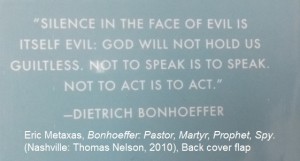 it in his speeches and his current website promoting the book, it may continue to be used inaccurately for some time to come.
it in his speeches and his current website promoting the book, it may continue to be used inaccurately for some time to come.
The appeal of this quote is understandable. The powerful arrangement of words elevates the importance of the cause and bringing Bonhoeffer to one’s side only strengthens the sense that the cause is just. However, since the quote isn’t his, using it is a false witness.
In checking out this quote, I have learned to appreciate Bonhoeffer so much more than when he was just a figurehead on social media. There is value in fact checking. I didn’t find Bonhoeffer behind the quote, but what I found by reading his actual words is much more valuable.
Note: I will add to this post if I find other information regarding the source of the quote pre-1998.
UPDATE: On 11/11/16, I published an update to this post. In it, I provide an image of a 1971 book with “Not to speak is to speak. Not to act is to act.” used together.
